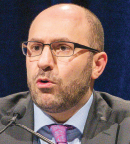In a phase II trial reported in the Journal of Clinical Oncology, Toni K. Choueiri, MD, and colleagues found that the combination of atezolizumab and bevacizumab was active in metastatic renal cell carcinoma with variant histology and clear cell renal cell carcinoma with ≥ 20% sarcomatoid differentiation.

Toni K. Choueiri, MD
Study Details
Sixty study participants were enrolled between July 2016 and October 2018. Patients were from four U.S. sites (Dana-Farber Cancer Institute; Beth Israel Deaconess Medical Center; University of California, San Diego Moores Cancer Center; and Karmanos Cancer Institute) with variant histology renal cell carcinoma (n = 40, including papillary in 12, chromophobe in 10, and unclassified in 9) or clear cell renal cell carcinoma with ≥ 20% sarcomatoid differentiation.
Treatment consisted of atezolizumab at 1,200 mg and bevacizumab at 15 mg/kg intravenously every 3 weeks, and treatment was continued until disease progression, intolerable toxicity, or withdrawal of consent. Overall, 65% of patients had no previous systemic therapy.
Responses
Median follow-up was 13 months. Objective response was observed in 20 patients overall (33%), including 9 (50%) of those with disease with sarcomatoid differentiation and 11 (26%) of those with variant histology renal cell carcinoma (P = .13 for association between histology and response). Response was observed in 31% of treatment-naive patients and 38% of previously treated patients. Median time to response was 2.7 months, and median duration of response was 8.9 months (range = 1.4–29 months).
KEY POINTS
- Responses were observed in 50% of patients with clear cell renal cell carcinoma with ≥ 20% sarcomatoid differentiation and 26% of those with variant histology renal cell carcinoma.
- Median duration of response was 8.9 months.
Among 36 patients with available programmed cell death ligand 1 (PD-L1) status, 15 (42%) had ≥ 1% expression on tumor cells. Response was observed in nine (60%) of the PD-L1–positive vs four (19%) of the PD-L1–negative patients.
Median progression-free survival was 8.3 months, and median overall survival was not reached.
Adverse Events
The most common treatment-related adverse events of any grade were fatigue (35%), proteinuria (35%), musculoskeletal pain (33%), diarrhea (22%), rash (20%), hypertension (18%), pruritus (18%), thyroid dysfunction (17%), hepatitis (15%), fever (13%), and mucositis (12%). Treatment-related grade 3 adverse events occurred in 33% of patients, and no grade 4 or 5 adverse events were reported. Potential immune-mediated adverse events that required prednisone or equivalent ≥ 30 mg/d occurred in six patients (10%).
Quality of life, assessed with the Functional Assessment of Cancer Therapy Kidney Symptom Index-19 and the Brief Fatigue Inventory, was maintained throughout treatment.
The investigators concluded, “In this study, atezolizumab and bevacizumab demonstrated safety and resulted in objective responses in patients with variant histology renal cell carcinoma or renal cell carcinoma with ≥ 20% sarcomatoid differentiation. This regimen warrants additional exploration in patients with rare renal cell carcinoma, particularly those with PD-L1–positive tumors.”
Dr. Choueiri, of Dana-Farber Cancer Institute, is the corresponding author for the Journal of Clinical Oncology article.
Disclosure: The study was supported by Roche, Genentech, and others. For full disclosures of the study authors, visit jco.ascopubs.org.

